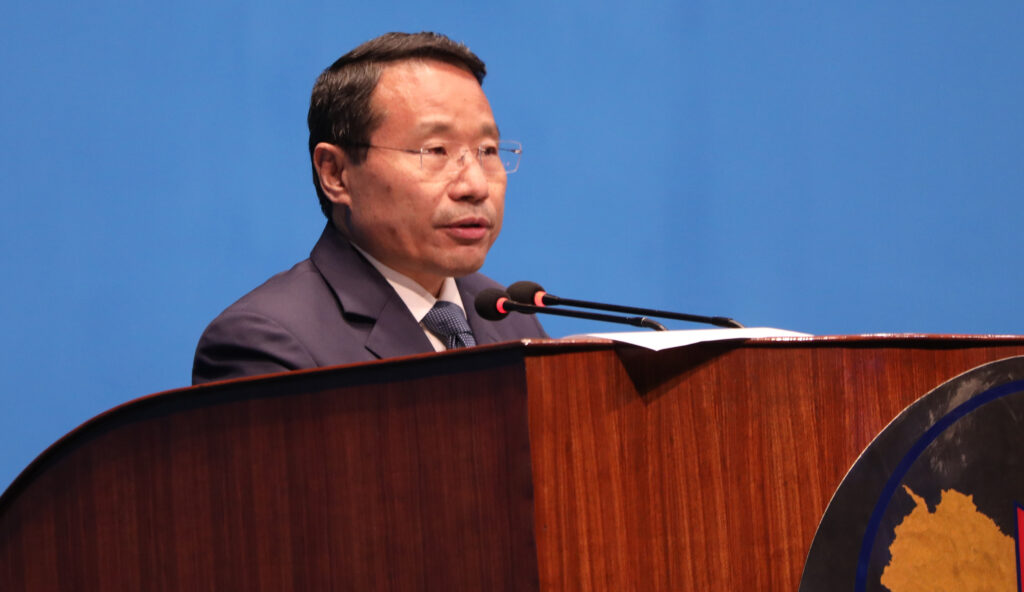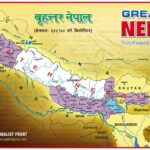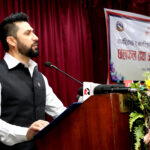Kathmandu, June 5:
Finance Minister Barsha Man Pun has said the budget is a booster to the national economy, as it was brought in line with the constitution, 16th periodic plan, review of the republic, and principles and priorities of the appropriation bill.
Constructive feedback from the lawmakers, government policies and programmes and commitments made in the international forums were also paid heed while bringing the budget, Minister Pun argued, adding that the economy was getting dynamic with a morale boost of the private sector.
The Minister was speaking in response to the lawmakers’ multiple queries about whether the budget would prop up the national economy. During the meeting of the federal parliament on Wednesday, he believed the financial sector would mobilize investable money to spur economic activities and projects.
“I assure you that we achieve a six percent economic growth with effective enforcement of policies and programmes incorporated in the budget. Resources were guaranteed, capital spending upped and projects ensured with budget allocation,” Pun claimed.
The government had unveiled the budget of Rs 1. 86 trillion budget for the fiscal year, 2024/25.
According to the Minister, the budget is not ambitious but balanced as compared to the past. It is not distributional but productive, he added.
The Finance Minister further assured the lawmakers that the national pride projects would not see budget crunch. Climate change has been kept in priority as per principles of climate justice.
As he shared, the tax system would be implemented as per report of tax reforms high level committee. Revenue administration will have better capacity and professionalism.
Uniformity was maintained in the excise duty by evaluating it with other countries.
HoR meeting: Effective implementation of budget stressed
Parliamentarians in today’s meeting House of Representatives (HoR) have pressed for effective implementation of the budget for the upcoming fiscal year 2024/25, terming that its implementation was challenging.
It may be noted that the incumbent government on May 28 announced a budget of Rs 1.86 trillion for the upcoming fiscal year.
Taking part in the discussion on the annual estimate (budget) of revenue and expenditure, parliamentarian Ramhari Khatiwada emphasized on promptness of government to effectively implement the budget.
Stating that there were cases of allocating budget but not implementing it effectively in the previous years, he drew the attention of the government through the Speaker of the House to prevent such situation.
According to him, adequate budget should be allocated for the mega projects and the government should pay attention for timely completion of such projects.
Khatiwada viewed that the trend of spending budget towards the end of fiscal year should be ended and development infrastructures should be prioritized.
Similarly, Ishwor Bahadur Lama hailed that some new programmes included in the budget were ‘positive’ and thus highlighted the need for effective implementation.
Furthermore, he demanded to observe May 29 as the Sagarmatha Day and give continuity to ‘Sagarmatha Dialogue’. Sagarmatha Dialogue is an initiative of the government of Nepal to host a permanent biennial global dialogue forum in Nepal starting from 2020.
Likewise, Tshiring Damdul Lama Bhote termed the budget as balanced, timely and dynamic, adding it has covered social justice, good-governance and prosperity.
Stating that the budget had prioritized five sectors as transformative areas, he underlined the need to make the budget implementation-oriented.
Sishir Khanal said the budget was balanced. According to him, although the budget could not accord any importance to minimizing the risks of climate change, inclusion of development of information technology and expansion of air connectivity among others were positive aspects of the budget.
Aain Bahadur Shahi Thakuri claimed that the implementation of the budget would be difficult since, he argued, that the budget was populist one. He grieved that the budget failed to adequately incorporate Karnalis’ issues.
Chandra Bahadur Bishwakarma saw the need for thought and commitment for budget implementation. Durga Rai said that the budget had incorporated transformative sectors and all regions, communities and geography.
Prem Suwal, however, argued that the budget could not address the reality of the country, expressing his discontent that the government handed over responsibility of carrying out ordinary tasks to the private sector.
Also, airing views, parliamentarian Deepak Giri lamented that there was no practical implementation of the annual budget.
Thakur Gairi said the budget was fundamentally right. He questioned whether the ruling parties could not maintain consistency in their common policies and programmes.
Purna Bahadur Gharti mentioned that he had full support for the budget presented by the incumbent government. According to him, the budget was a positive one since it had made a pledge for implementation of constitution, increasing employment, completing remaining works of peace process and building socialism-oriented economy.
Santosh Pariyar demanded to declare Kathmandu City as a ‘Cultural City’. He emphasized on moving ahead reducing the existing gap between current expenditure and capital expenditure.
Krishna Kumar Shrestha underlined that the budget had highly prioritized issues such as underground irrigation programme in Terai-Madhes, shallow tube well irrigation and agro development such as making soil fertile.
He argued that the government did not pay attention to addressing acute shortage of drinking water in Terai-Madhes.
Amresh Kumar Singh commented that the budget was allocated on the basis of political influence and it did not pay attention towards addressing recession in economy.
Various parliamentarians such as Bina Jaiswal, Sushila Shrestha, Sonu Murmu and Sarbendranath Shuikla critically commented on the budget for coming fiscal year.
(RSS)



